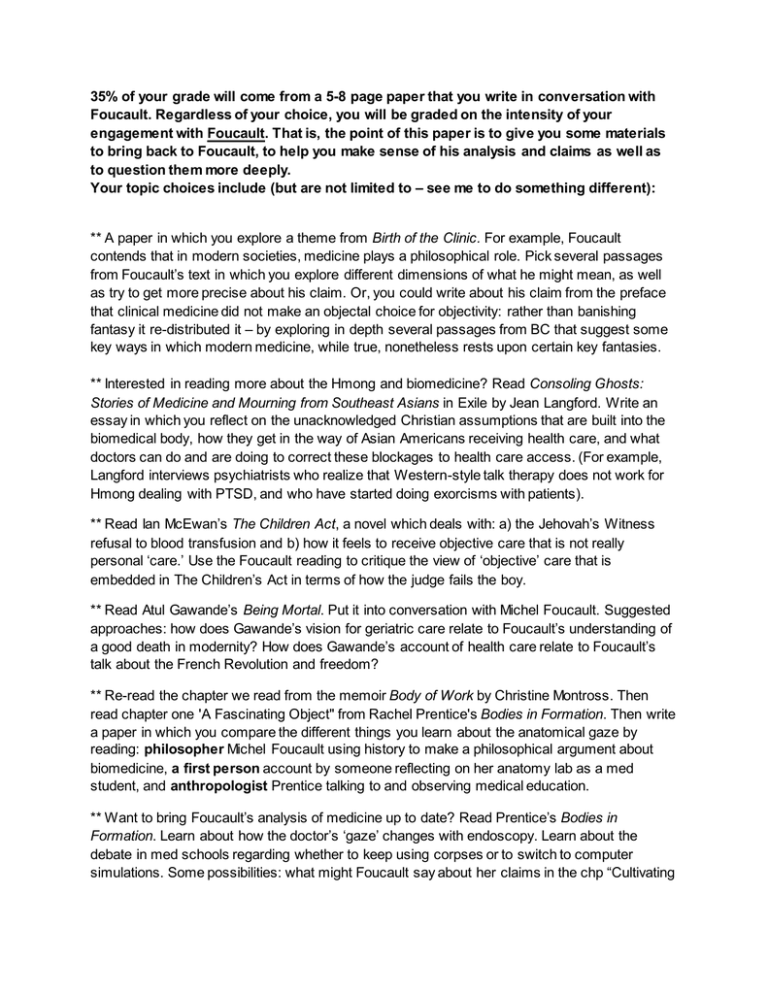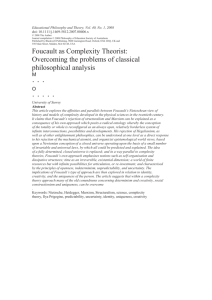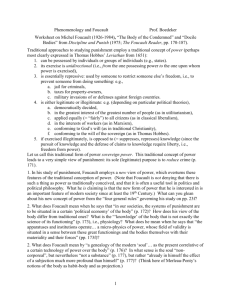35% of your grade will come from a 5-8 page... Foucault. Regardless of your choice, you will be graded on...
advertisement

35% of your grade will come from a 5-8 page paper that you write in conversation with Foucault. Regardless of your choice, you will be graded on the intensity of your engagement with Foucault. That is, the point of this paper is to give you some materials to bring back to Foucault, to help you make sense of his analysis and claims as well as to question them more deeply. Your topic choices include (but are not limited to – see me to do something different): ** A paper in which you explore a theme from Birth of the Clinic. For example, Foucault contends that in modern societies, medicine plays a philosophical role. Pick several passages from Foucault’s text in which you explore different dimensions of what he might mean, as well as try to get more precise about his claim. Or, you could write about his claim from the preface that clinical medicine did not make an objectal choice for objectivity: rather than banishing fantasy it re-distributed it – by exploring in depth several passages from BC that suggest some key ways in which modern medicine, while true, nonetheless rests upon certain key fantasies. ** Interested in reading more about the Hmong and biomedicine? Read Consoling Ghosts: Stories of Medicine and Mourning from Southeast Asians in Exile by Jean Langford. Write an essay in which you reflect on the unacknowledged Christian assumptions that are built into the biomedical body, how they get in the way of Asian Americans receiving health care, and what doctors can do and are doing to correct these blockages to health care access. (For example, Langford interviews psychiatrists who realize that Western-style talk therapy does not work for Hmong dealing with PTSD, and who have started doing exorcisms with patients). ** Read Ian McEwan’s The Children Act, a novel which deals with: a) the Jehovah’s Witness refusal to blood transfusion and b) how it feels to receive objective care that is not really personal ‘care.’ Use the Foucault reading to critique the view of ‘objective’ care that is embedded in The Children’s Act in terms of how the judge fails the boy. ** Read Atul Gawande’s Being Mortal. Put it into conversation with Michel Foucault. Suggested approaches: how does Gawande’s vision for geriatric care relate to Foucault’s understanding of a good death in modernity? How does Gawande’s account of health care relate to Foucault’s talk about the French Revolution and freedom? ** Re-read the chapter we read from the memoir Body of Work by Christine Montross. Then read chapter one 'A Fascinating Object" from Rachel Prentice's Bodies in Formation. Then write a paper in which you compare the different things you learn about the anatomical gaze by reading: philosopher Michel Foucault using history to make a philosophical argument about biomedicine, a first person account by someone reflecting on her anatomy lab as a med student, and anthropologist Prentice talking to and observing medical education. ** Want to bring Foucault’s analysis of medicine up to date? Read Prentice’s Bodies in Formation. Learn about how the doctor’s ‘gaze’ changes with endoscopy. Learn about the debate in med schools regarding whether to keep using corpses or to switch to computer simulations. Some possibilities: what might Foucault say about her claims in the chp “Cultivating the Physician’s Body”? Compare and contrast how Foucault says doctors “see” with Prentice’s account of how doctors see when they do surgery with cameras. ** Read an excellent medical ethnography: Sherine Hamdy’s Our Bodies Belong to God: Organ Transplants, Islam, and the Struggle for Human Dignity in Egypt (Berkeley: Univ of CA, 2012). Foucault says that in Europe, it was no longer the case that Christianity opposed cutting people’s bodies open for science – this was a fantasy that doctors circa the French Revolution needed. Hamdy has to work hard to learn something somewhat similar: that what she assumes about religious prohibitions is not the case, at least not in the simple way she thinks it is. She has to learn how to hear what Egyptian Muslims mean when they say “our bodies belong to God.” Write an essay about her intellectual journey: what do they mean? How does she learn to hear it? What lessons and skills does she offer to the rest of us as we try to hear what people mean in the overlap between religion and medicine? ** Read an ethnography of the role of biomedicine in Inuit Canada that focuses on the different understandings that Inuit have of death: Lisa Stevenson, Life Besides Itself (Berkeley: Univ of California, 2014). This is an excellent book – it will make you rethink both ‘care’ and death. It is very powerful (I thought). Write an essay in which you reflect on the difference in perspective toward death and specifically suicide – or the kind of care that objective medicine provides -that Stevenson conveys vis-à-vis Foucault. ** Interested in Foucault’s claim that in modern democratic societies, medicine is one of the ways that people are governed? Read Against Health, edited by Jonathan Metzl and Anna Kirkland. Then pick (at least) two case studies from the essays collected in that book and use them to flesh out Foucault’s claim. ** Read Sharon Kaufman’s And a Time to Die: How American Hospitals Shape the End of Life. Then write an essay in which you use Foucault’s insights to reflect on Kaufman’s analysis of modern death. ** Your dream topic not above? Send me an email proposing one … Difficulty of readings: And a Time to Die – easy Being Mortal -- easy Against Health – easy The Children Act – easy to moderate Consoling Ghosts -- moderate Life Besides Itself – moderate to difficult Bodies in Formation – moderate to difficult Our Bodies Belong to God -- difficult



